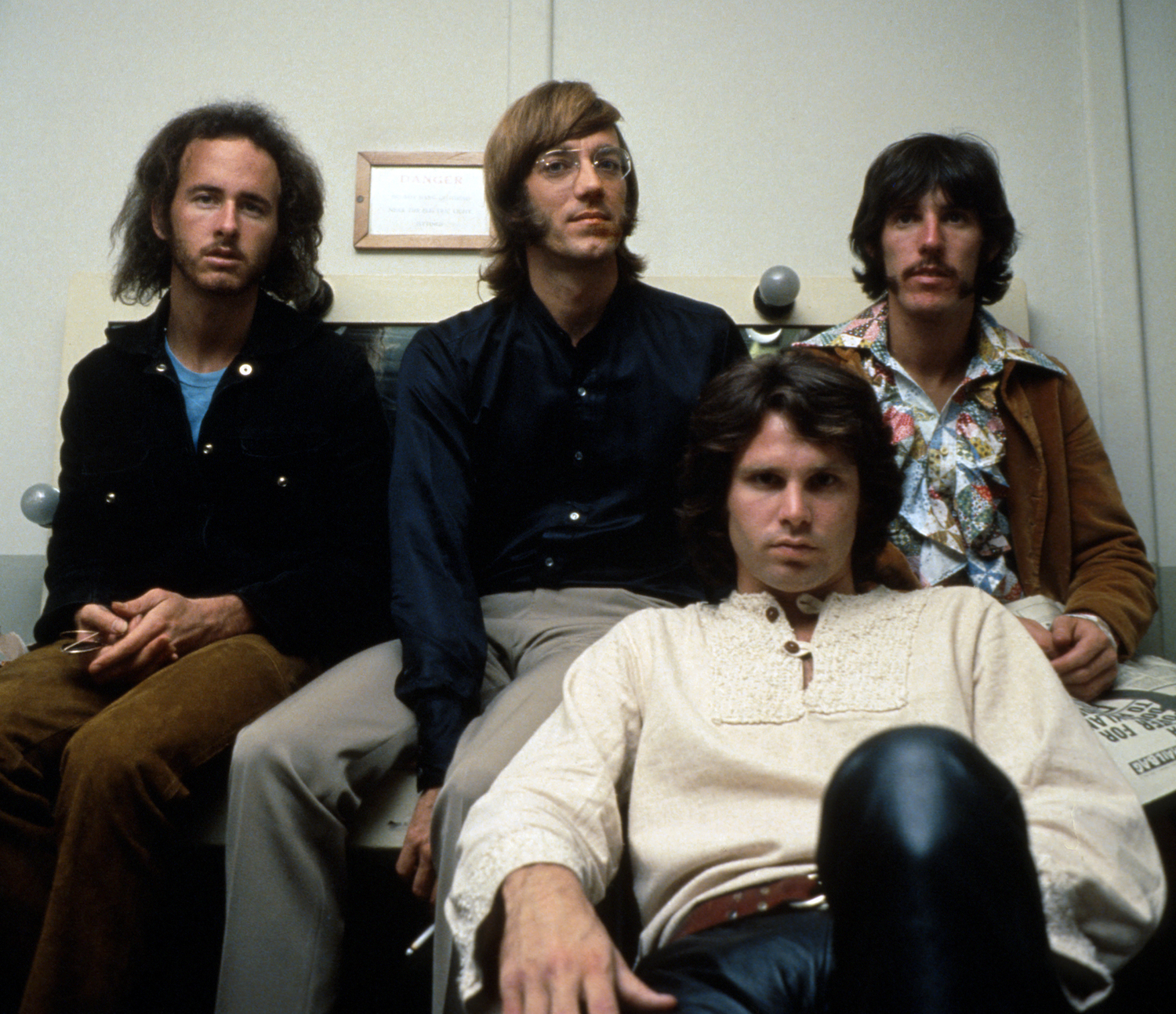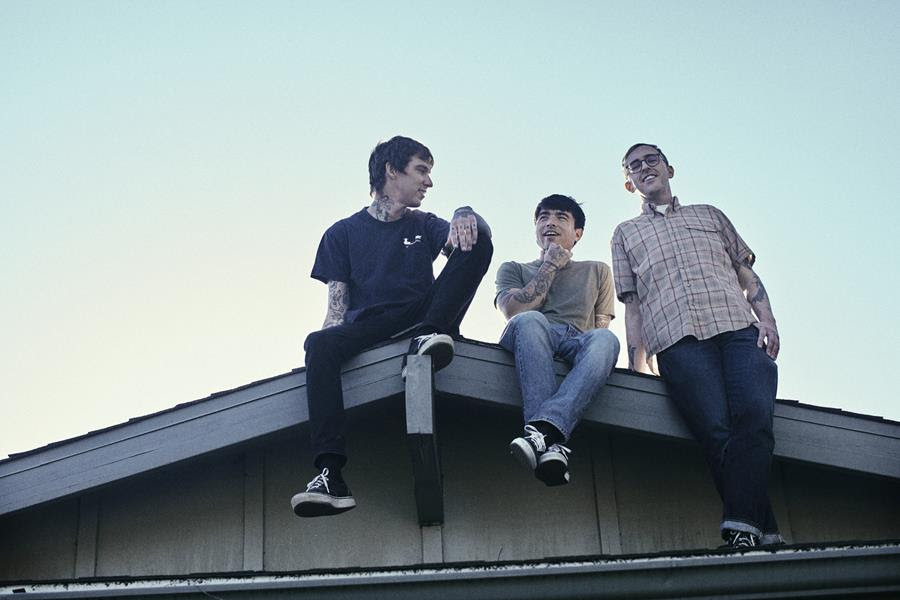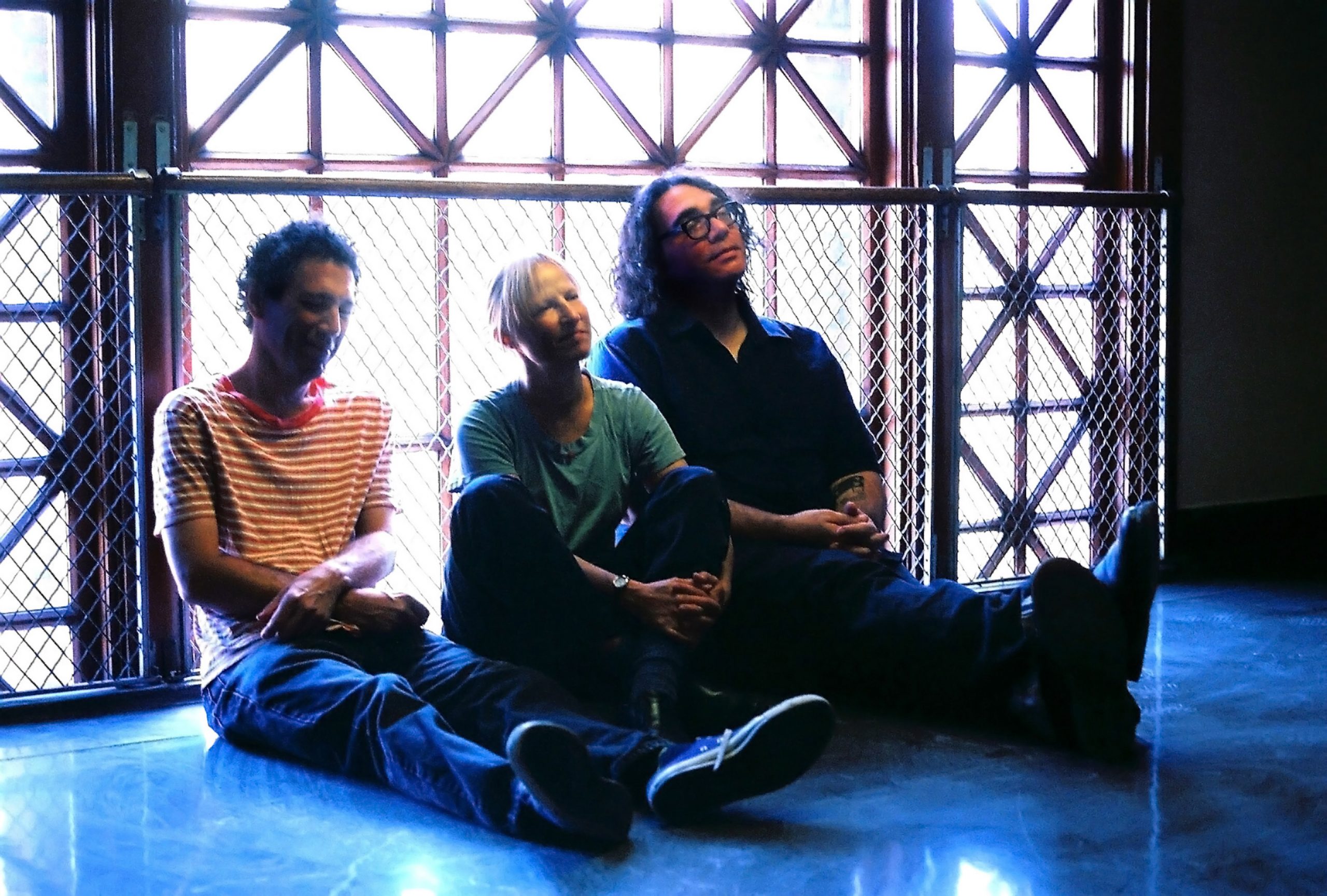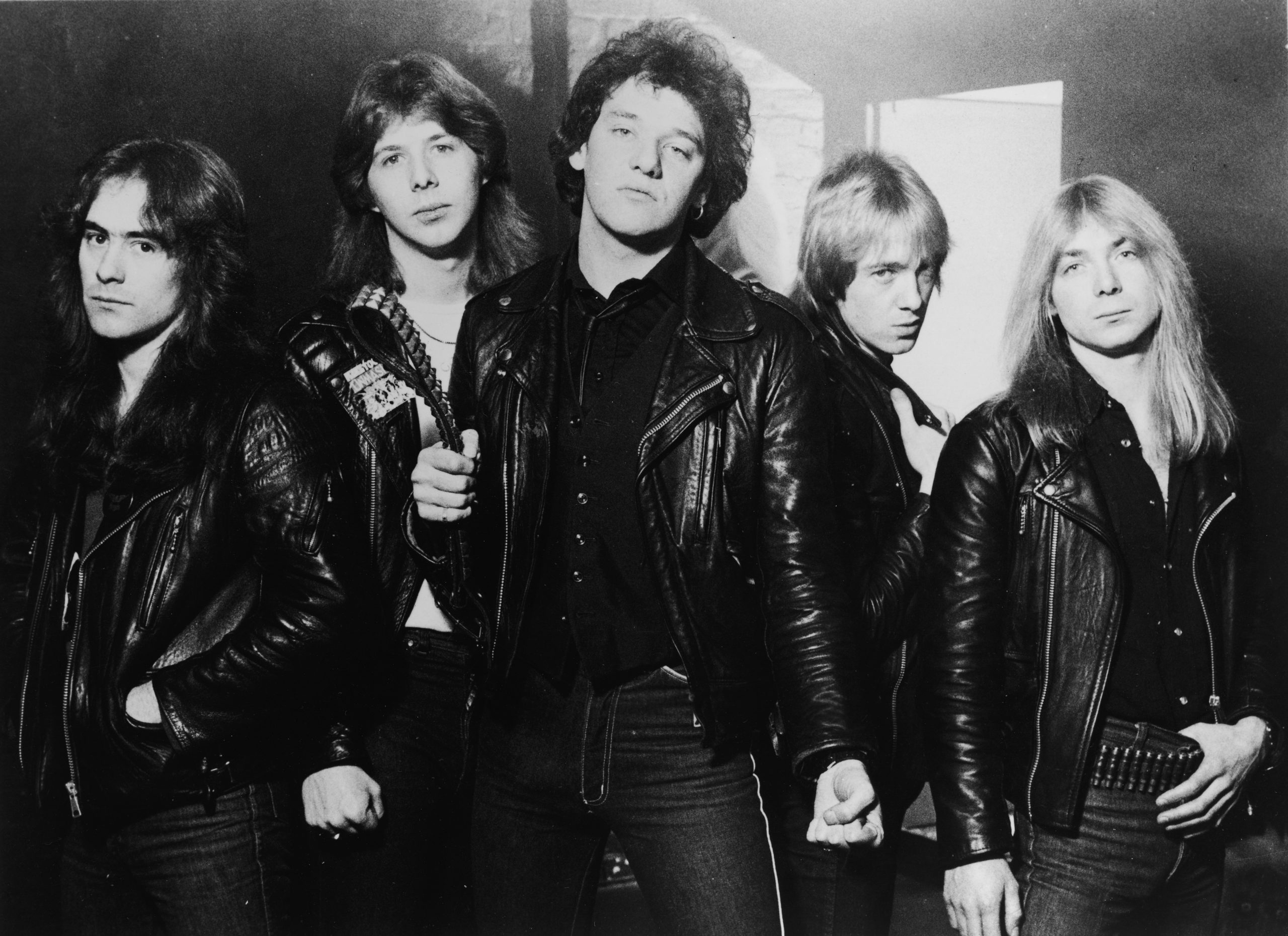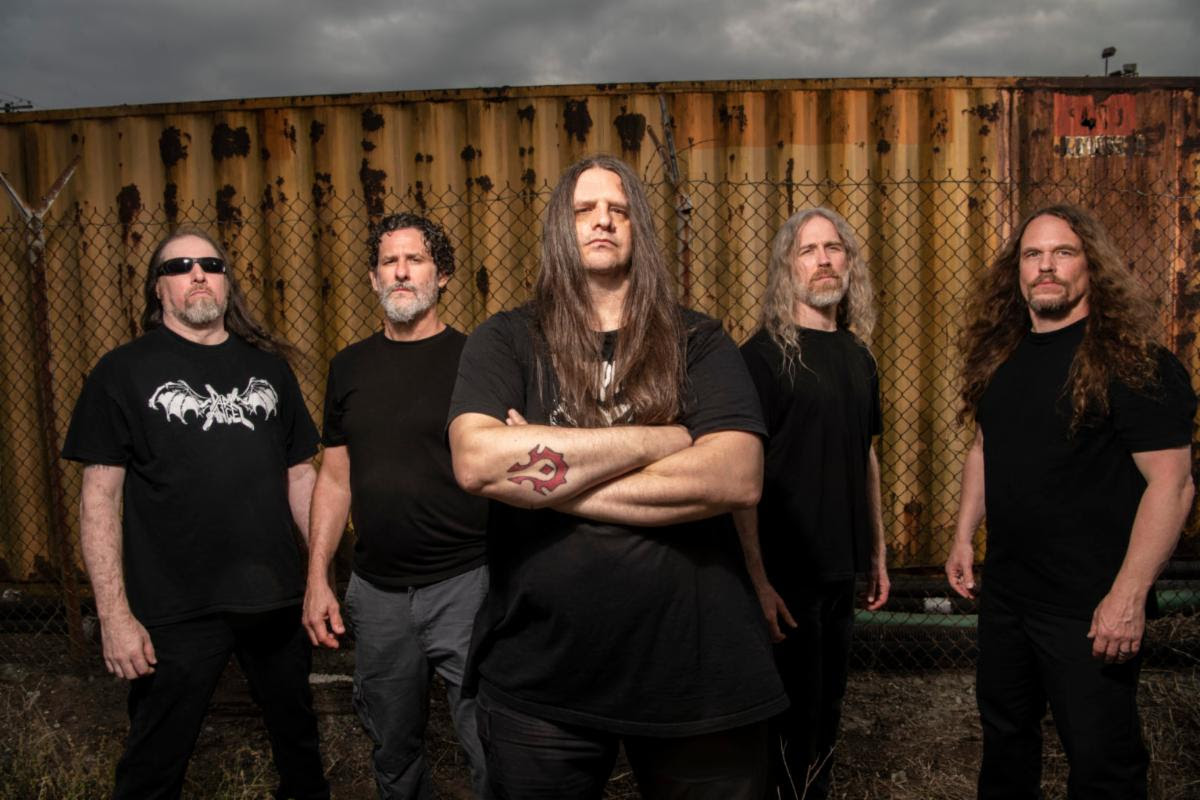The Doors are part of a very specific category of classic-rock artists: the gateway artists. The bands that -- assuming you weren't around in the '60s -- are amongst the first names you explore when you start digging into pop music's past. Though keyboardist Ray Manzarek, guitarist Robby Krieger, and drummer John Densmore were all crucial to forming the very specific and unique sound of the Doors, the person who pushed them into legendary status was Jim Morrison, the erratic singer and iconic frontman who became lionized after dying in Paris, at 27, in 1971. This inextricably bound the Doors in the narrative of the '60s and rock history. Morrison is part of the legendary 27 Club, along with fellow '60s casualties Janis Joplin, Brian Jones, and Jimi Hendrix (and, later, Kurt Cobain and Amy Winehouse) who died at that age. In the specific case of Morrison and the other legendary '60s artists who died around the same time, it formed one element of the story of how the '60s failed, how they burned out into moments like the Hell's Angels at Altamont or the Manson Family murders. By the time you get to the end of the 20th century or the beginning of the 21st century, this means these people are preserved and held up, forever, as tragic icons of their day. Which also means that when you're 13 or 14 and first discovering the music of your parents' or grandparents' generation, you see Jim Morrison's face on T-shirts in the mall, or you see the millionth biography or the millionth Doors reissue, either with Morrison's face staring back at you.
In spite of all that, it's hard to get a handle on what exactly their legacy is. This is a band that was commercially successful when they existed, and have continued to be so as one of those classic artists whose music is always accessible. They received a lot of critical praise at the time, too. This is somewhat anecdotal, but it seems like their ongoing legacy has oscillated in the ensuing decades. They're an easy historical punchline for music critics; they are the kind of artist you can get obsessed with at 14 and leave behind as you get older. Morrison's lyrics and poetry seem totally profound when you're a teenager, and then it's easy to find yourself questioning that stance at a later age. They are one of the bands that most consistently can be held up as all the follies of rock history. With the remaining members never having done much of note since Morrison's death, anytime they pop on the radar now it's an interview that hits the same beats, that glorifies the '60s and Morrison all over again. There's something about this that yields dismissiveness. You can get cynical about it: Here's a relic from a very specific time and place, and here it is being sold to us in new packaging once more, so here we go with '60s icons telling you one more time that, yes, that era really was as much of an apotheosis or whatever as a few decades of Baby Boomer self-mythologizing has told us it was. Romanticizing past eras or Morrison as a tortured artist aside, though: yeah, of course there is a lot of amazing, formative music from the '60s, and the Doors' six album run with Morrison deserves to be counted among it. The snideness that can develop around the Doors and Morrison doesn't seem totally deserved.
Maybe some of it comes from just how much these guys were of their time and place, even relative to their peers. Morrison was one of the people who created the notion of a rock frontman as we know it. It was only during the Doors' lifespan that bands started playing to large crowds in venues larger than a club, or in fields full of people. A different breed of performer, within the specific sphere of classic rock, came into being: the Rock God. Morrison is one of the perfect archetypes of that -- bombastic, enigmatic in ways, the women, the alcohol. There might be something that comes off as histrionic and over-the-top and illegible about that these days. There are plenty of great and engaging singers at the front of rock bands born in the 21st century, but are there frontmen like Morrison anymore? People as singular and overwhelming, as worshipped as voice-of-a-generation types? I'm not saying this to fall down that rabbit hole of romanticizing past generations of musicians. The point is that while Morrison was one of the best at what he did, his kind of persona wouldn't scan in the landscape of 2015. If you saw a band with a frontman like Morrison today, he'd probably seem like an asshole. The world has shifted, and the personalities of the musicians we love mostly have with it.
The other lingering question with the Doors is that of influence. They were a massive band and have obviously had lasting impact on the culture, but are there that many artists who sound like they're overly influenced by the Doors relative to the countless artists who have ripped off the Beatles, the Rolling Stones, or Led Zeppelin? Or even the Who? Echo & the Bunnymen covered "People Are Strange," and took a lot of cues from the Doors, mixing it in with post-punk and New Wave to mostly brilliant results. Eddie Vedder sang with the Doors at their 1993 induction into the Rock And Roll Hall Of Fame. Glenn Danzig sings a hell of a lot like Morrison and apes him in other ways, too. (Look familiar?) Scott Weiland is in the club, too. Ian Astbury of the Cult was massively influenced by Morrison and the Doors, which is audible enough and visible enough in his own performances, but became all the more obvious when he actually replaced Morrison for the ill-advised Doors Of The 21st Century group that Manzarek and Krieger put together. (Sidenote: I actually saw Astbury perform with them at a casino in Atlantic City sometime in the mid-'00s. In hindsight, it was very odd and a little creepy, with the band hawking all sorts of merchandise with only Morrison's visage or lyrics on it.) There are others, but it's not the longest list for a band with the profile of the Doors. Aside from Echo & The Bunnymen, you could level the same critique at any of these artists that you could at the Doors: that they are the cartoons of rock history. Weiland and Astbury in particular come off like the kind of guys who are, well, a little out of touch with the world around them and what rock musicians look and act like these days. And this is coming from someone who likes every artist mentioned above, to some extent or another.
Beyond that, you have other major footprints in pop culture. There was Oliver Stone's 1991 biopic The Doors, a bizarre and inaccurate fever dream account of the band. There was Philip Seymour Hoffman's Lester Bangs character in Almost Famous ranting about the Doors (as Bangs himself did in real life). In Wayne's World 2, Wayne has a dream where Morrison is his weird spirit guide in the desert. All of these things, similar to the artists who followed the band, exacerbate the matter. Here's a legendary band, and who knows if we're supposed to take them seriously. Before writing this, I had hardly returned to their music since high school. I took them very seriously then. And it turns out the catalog holds up. It's worth taking seriously now.

Bands change singers, or continue on without their original singers. It happens. But one of the weirder examples of this is the Doors, who actually released two albums after Morrison's death, with Manzarek and Krieger splitting vocal duties. These are historical oddities, stuff even the band seemed to disown for a while, with neither Full Circle nor 1971's Other Voices seeing any sort of reissue until the '00s. It seems sort of insane, in hindsight, that Manzarek and Krieger would try to step in for Morrison, one of the most distinct voices in classic rock. As you'd expect, there's some ineffable factor missing without Morrison in the equation; they'd lost that specific dynamic of those four men playing off of one another. Every now and then on Full Circle, you can hear traces of the Doors' past glories. There will be some dexterous guitar line from Krieger, or you could even picture, for a second, Morrison howling over "The Peking King And The New York Queen." But there's no getting around the fact that this is nowhere near the quality of the canonical Doors albums. Not only was a key component of their identity missing, a lot of the music doesn't sound like what we expect from the Doors. Part of that's cool — it makes you wonder what directions they might've gone with Morrison in the '70s. Mostly, with Manzarek's and Krieger's relatively anonymous voices leading the way, the album sounds like the work of a generic '70s artist that somehow got the wrong band's name on the cover. (The cover, by the way, also makes this feel totally detached from everything else, which mostly felt as if it all fell within the same general design aesthetic.) Full Circle is an interesting thing to discover now that you can access it easily again, but when you compare it to what came before it's more of a curiosity than a worthwhile work on its own merits.
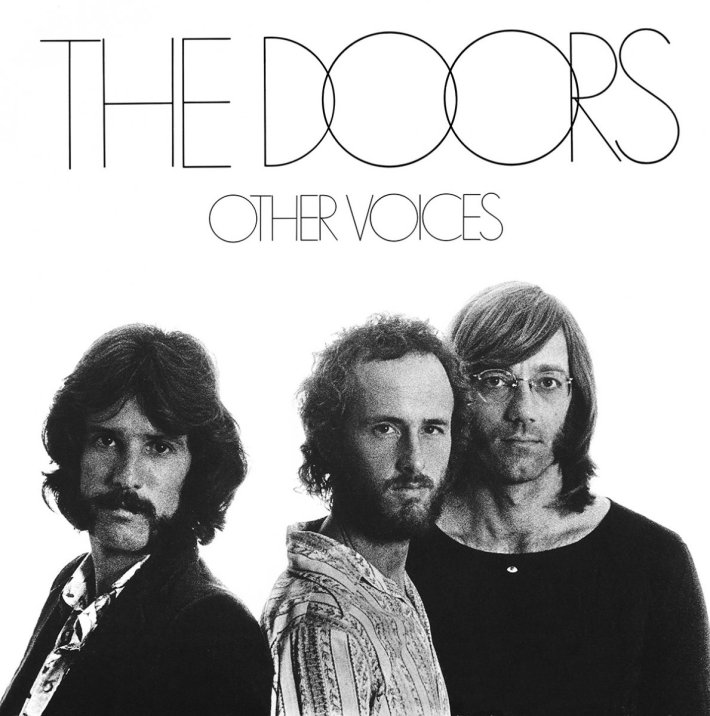
Released just six months after L.A Woman, Other Voices supposedly features songs Manzarek had rehearsed with Morrison before the latter's departure for France. With the band still working on music with Morrison in mind, Other Voices sounds more of a piece with their other work than its successor, Full Circle. On one hand, this makes for better music. Material like the languid "Ships w/ Sails" feels like a continuation of the Doors' musical development on L.A. Woman, where Full Circle's flirtations with fusion make it sound like the work of another band altogether. The other side of that, however, is that it's hard to hear the end of "Tightrope Ride" and not picture Morrison's voice singing it instead. This problem is much more inherent to Other Voices than Full Circle, making it an album that is hard to enjoy without letting context interfere. It's especially true given that Manzarek especially delivers melodies in a cadence similar to Morrison's, even finding graveled yells that echo the form of Morrison's but lack the same ferocity. If they'd released Other Voices under a different name, chances are the Doors could've made this album stand on its own. The music was still there, it's just too weird of a proposition to have a Doors album without Morrison singing these melodies. Like Full Circle, it's an album that is an interesting curiosity for completists, but will probably never be able to live on beyond being a strange footnote in classic rock history.

An American Prayer isn't exactly a Doors record. It's an album of Morrison reading his poetry, recorded in 1969 and 1970. The remaining Doors reunited in 1978 to record a bunch of music behind the left-behind recordings. For the most part, it's a totally different listening experience than the other Doors releases, though there are Doors songs, and musical references to Doors songs, throughout. Even though Morrison occasionally delivered lyrics like this amongst Doors music, a sustained album of poetry is kind of its own thing. As an entity in the Doors' overall narrative, An American Prayer was controversial. Some argued that Morrison's work should have been left untouched, and that the remaining trio didn't represent the material in the way Morrison had intended. This might be a cynical interpretation, but: Over the decades, it was easy to be suspicious of Manzarek, who had a tendency to rely on every last strain of Morrison's work and legacy to, I don't know, give himself something to do? You could look at this as the Doors milking Morrison's work after his death. But whatever the intentions or circumstances were behind An American Prayer, it gave diehard fans another document of Morrison's work. It's more related to the essence of the Doors than either Other Voices or Full Circle, making it a more worthwhile thing to explore beyond the original six albums.
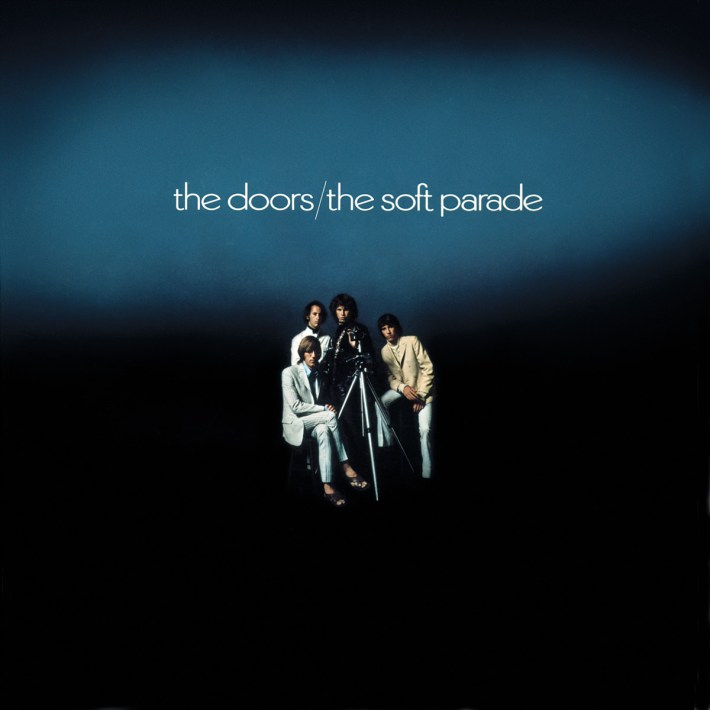
The Soft Parade is easily the weakest of the six albums the Doors made while Morrison was alive, but it's not quite as much of a failure as it's often been perceived. One of the obvious bright spots is "Touch Me," one of the Doors' effortless pop songs. "The Soft Parade" is the weirdest of their epic-length album closers, with its final five minutes sounding like the kind of thing that should've soundtracked a lot of weird druggy late-'60s parties in the woods, or something. "Runnin' Blue" sounds like a mess because of that Dylan parody of a chorus, but aside from that, Morrison sounds pretty great over the blaring brass embellishments. Moments like that and "Touch Me" are examples of when The Soft Parade worked, because they're the ones where the Doors' temporary experimentation with a ton of orchestration clicked. Elsewhere, all the string parts can get a little over the top, as if the band's trying to distract you from the fact that the album is primarily composed of songs that would be second- or third-tier material on any of the other Doors record. The Soft Parade is an interesting detour in the Doors' catalogue because of all that, but there's also something about all the orchestration that just doesn't line up with the core spirit of the band; it's not that it sounds forced, just unnecessary and ineffective. Soon enough, they would reboot with Morrison Hotel.
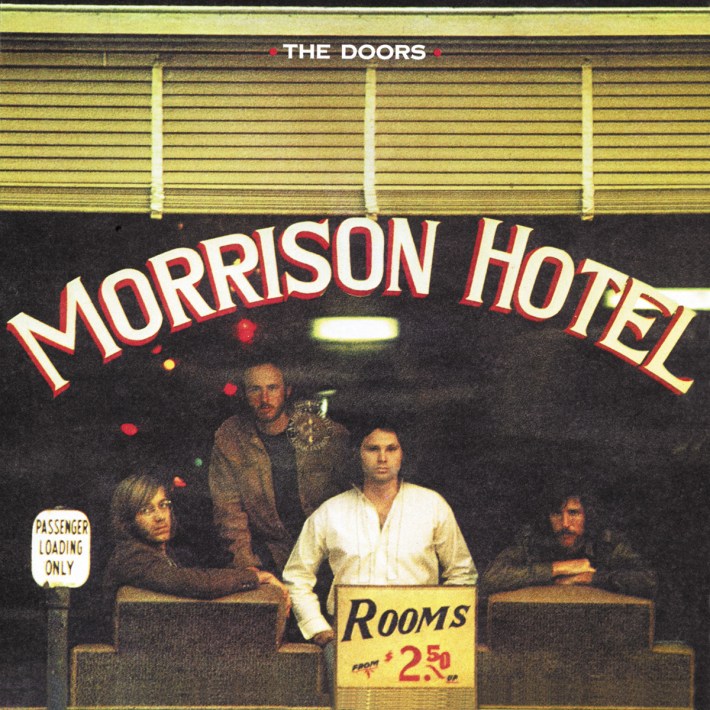
This is where this list becomes a free-for-all. Considering how dismissive people can be about the Doors these days, it's pretty surprising to remember that their catalog is, well, close to impeccable. Morrison Hotel is a crucial album in their career, the comeback and reinvigoration after the The Soft Parade. It was when they settled on their final form, a more direct and muscular blues-rock that could be drunkenly ferocious and swaggering on tracks like "Roadhouse Blues" and "Maggie McGill," with less of the psychedelic-pop vestiges of their past. But while the opening one-two of "Roadhouse Blues" and "Waiting For The Sun" is one of their best song pairings, Morrison Hotel gets a little uneven through its middle, with cartoonish songs like "Ship Of Fools" and "Land Ho!" Generally speaking, this is an odd catalogue to rank when you get to this point because Morrison Hotel doesn't do too many things wrong; you could easily rank it higher, and most people probably would. But while the playing and songwriting is on par with any of their other finest moments, it lacks some of the stunning deep cuts and massive hits of their other records, and they wound up far outdoing this version of themselves the following year with L.A. Woman.
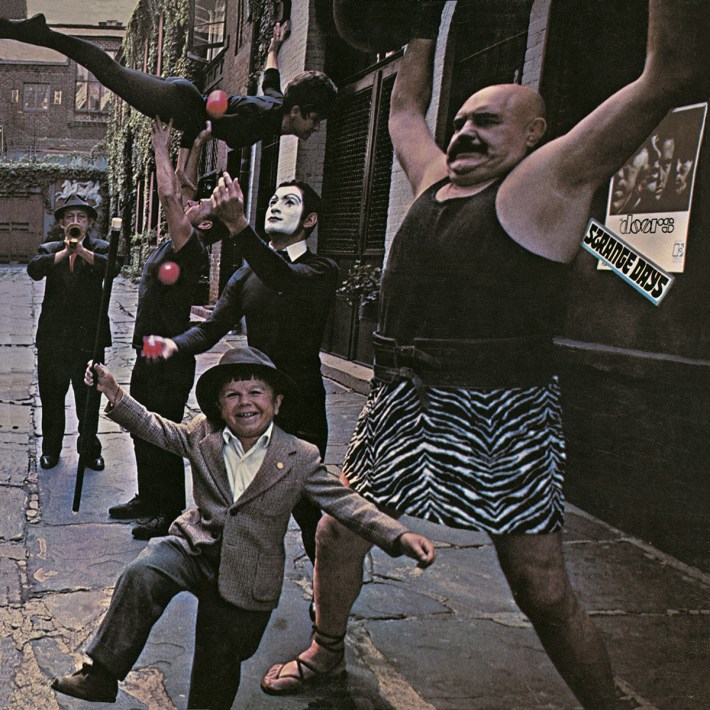
The Doors started their career with an overabundance of riches. Strange Days followed their self-titled debut later in 1967, and was made up of a bunch of stuff that hadn't made it onto its predecessor. While "Love Me Two Times" and "People Are Strange" are two of the lesser tracks you'd find on any Doors singles compilation, Strange Days is packed with album cuts that are stunning. This is where they committed to a more psychedelic sound in a more thorough and sustained way than at any other point. Tracks like "Strange Days," "Unhappy Girl," and "Moonlight Drive" are lush, but that lushness — like the synthesizers in the title track or Krieger's slide work on "Moonlight Drive" — is ever so off-kilter, a little sea-sick. It sounds like some kind of underwater nightclub. But even as Strange Days is loaded with great textures, it's also a punchy and efficient album; aside from the titan closer "When The Music's Over," no song on the album reached the three and a half minute mark. Overall, it's also their least bluesy album (though it may be equal with Waiting For The Sun in that regard). The Doors perfect their brand of psychedelic pop, a brand that has their trademark muscularity but trades in relentless hooks rather than the blues sprawl of some of their later work. That's the case for "Moonlight Drive," but also for a hidden gem like "My Eyes Have Seen You," where Morrison delivers the infectious chorus in that awesomely ragged yell he could just leap right into. The Doors came out swinging with the self-titled and Strange Days back to back, and while this wound up being a semi-outlier in their catalogue, it deserves its reputation as one of the finest documents of '60s rock.
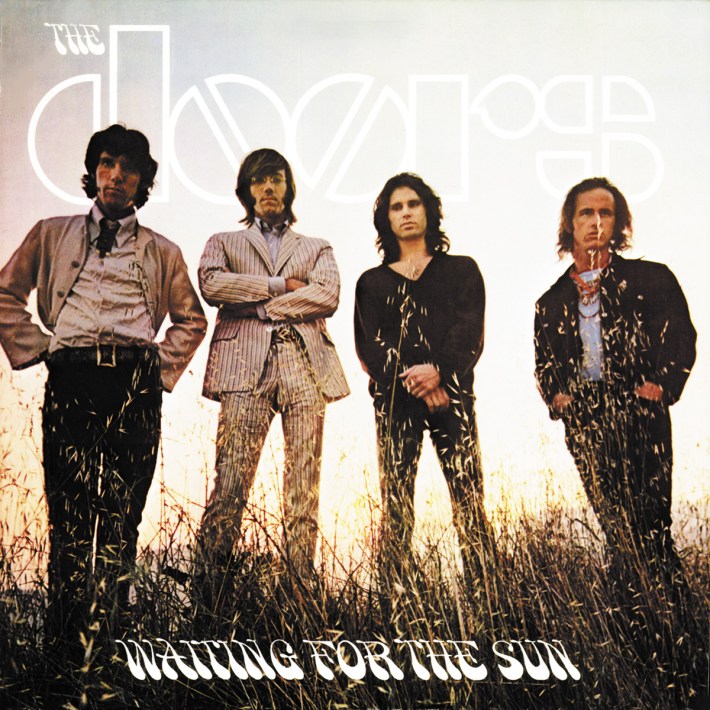
Waiting For The Sun, in a way, would be an easy candidate for being lumped in with The Soft Parade as the Doors' weaker middle period between their impressive 1967 and their rawer last act. It received mixed reactions back in the '60s, and its lingering reputation seems to be as a loose collection of songs more so than a record. That isn't too far off: Waiting For The Sun has no unifying sound or mood in the way that Strange Days or Morrison Hotel do. It leaps between different emotions and styles radically between tracks, from the straight-up '60s pop of "Hello, I Love You" to flamenco guitar on "Spanish Caravan" to snarling apocalyptic rock on "Not To Touch The Earth" and "Five To One," to whatever it is "My Wild Love" is. But just look at the songs on this thing. Aside from "Hello, I Love You" being one of the most perfect singles of the '60s, you have a whole set of high watermarks from the Doors' career, like the twisted psychedelia of "The Unknown Soldier" to the aforementioned "Five To One," the best song the band ever recorded. While the Doors rhythm section often excelled at incorporating jazzy flourishes into pop music, there's something way more impactful in them tightening it up like this: the groove of "Five To One" is menacing, badass, immortal. Sure, listening to it as an album is sort of a whiplash experience, but that's part of what makes it great in its way. This is the Doors at their strangest, their most exploratory, their most stylistically expansive. Waiting For The Sun has examples of everything the Doors did well, and it has them doing it at, occasionally, their highest level.
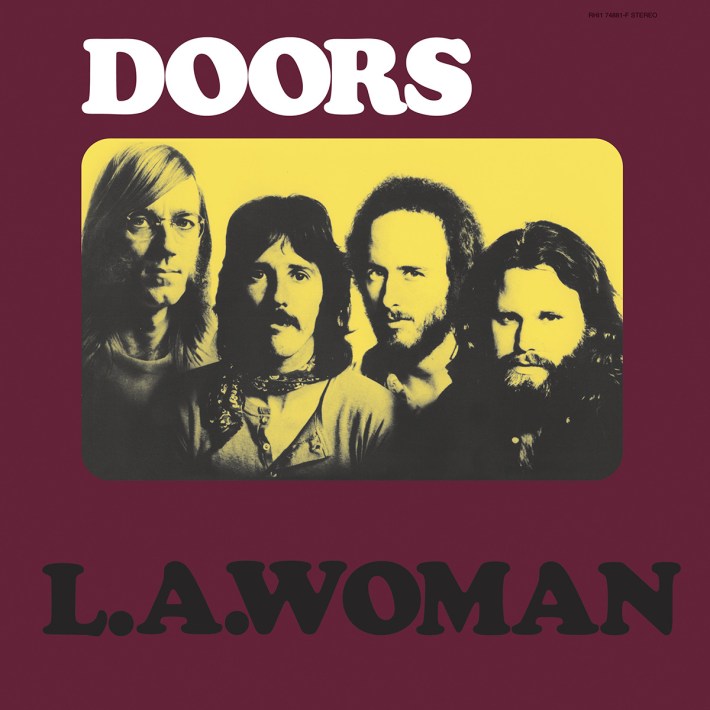
L.A. Woman, on one hand, is a continuation of the ethos and sound the Doors had returned to on Morrison Hotel, but it also feels like a final chapter that stands apart from everything that preceded it. It traveled the same raw blues-rock lane as its predecessor, but now the Doors sounded ragged, bleary. It's one of those early-'70s records that comes off like a beleaguered hangover from the end of the '60s. At the same time, these are some of the Doors' most fleshed-out and muscular recordings, partially due to the fact that they worked with a bassist and rhythm guitarist this time around. Though Morrison was more involved and interested in these sessions than he had been on other latter-day albums, this was also close to the time of his death. You can hear his lifestyle in the music here, with his voice sounding like he'd seemingly aged an extra decade as soon as 1971 hit. There's some inherent Doors quality to the sound of this record that they had flirted with in the past but grow up into in a different way. Maybe it was the chronicles of life in Los Angeles, maybe it was that a blues-rock sound as frayed as it was emphatic, but this is a version of the Doors they in ways always seemed to want to be. Unfortunately, they only found it late in the game, and wouldn't get the chance to fully explore it. For Morrison in particular, this kind of weathered bluesman poet sound was an interesting look after his '60s celebrity provocateur bit. Collectively, they seemed inspired by wherever they were at in this moment, resulting in brilliant career peaks like the title track (the primary rival to "Five To One" as their best moment, period), "Love Her Madly," the gorgeous and haunting "Riders On The Storm." "Hyacinth House" is secretly one of the Doors' finest songs, the more straightforward pop song on the record that still fits into the universe of L.A. Woman; the way Morrison delivers the lines "And I'll say it again/I need a brand new friend" sounds like a man who has seen way too much for his young age. Who knows what could've come after. The Doors here sound so quintessentially '70s, it's easy to wonder whether that decade would've inherently suited them better. Either way, it's a shame that the story was abruptly cut short only months after L.A. Woman. There had been so many moments in the Doors' past where Morrison tried to force mythic qualities. Here, they simply were: this is music that sounds born from some desert wasteland deep in the country, on the edge of something or another, wielding some warped shaman vision of America.
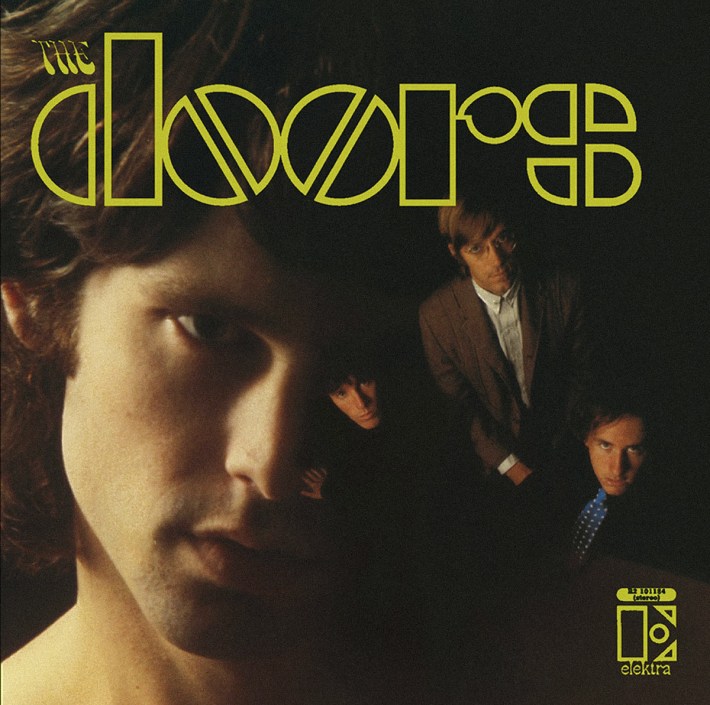
When you think of the Doors, it's all here, fully formed in their debut. The mix of blues, jazz, rock, and psychedelia; the sinewy grooves with Morrison's immortal howls and charisma. The Doors has one of the most specific sounds of any of their other work: This entire thing sounds inspired by and written in a smoky, middle-of-the-night world. Released in 1967, it almost positioned them to always have been a band that was really about the end of one thing and the beginning of another. There's something harder, a little more dangerous, about the Doors' character than the '60s greats who had started earlier in the decade. They're a band that seems to capture the narrative of the '60s spinning out of control and collapsing into the decadence of the '70s. And they synthesized all of that perfectly, here, right in the beginning. It's one of those all-time great debut albums."Break On Through," "Light My Fire," "Soul Kitchen," and "The End" are all still some of the most iconic songs associated with the band. And that's before you get to "The Crystal Ship," which boasts one of Morrison's best vocal performances, or to the infectious '60s pop moments like "Twentieth Century Fox" and "I Looked At You." Then you get to "Take It As It Comes," a rapid burst of just over two minutes that boasts an unshakeable chorus that ranks it amongst the band's best deep cuts. Bands worked at such a quick pace back then that, really, who knows how much thought the Doors were able to put into this versus the five albums they would churn out by early 1971. But maybe, on some level, they realized the impossible highs they'd already reached on their debut. Before the reboot of Morrison Hotel, the Doors were trying variations on the same themes and tricks — discovering new corners of their sound, sure, but also seemingly in search for the perfect balance of The Doors, trying to recreate this and never quite getting there in the same way again. Whatever fluctuations the Doors' legacy goes through as a band, there's no getting around it: this is one of the classic, iconic records of the '60s, and it holds that status for a reason.
